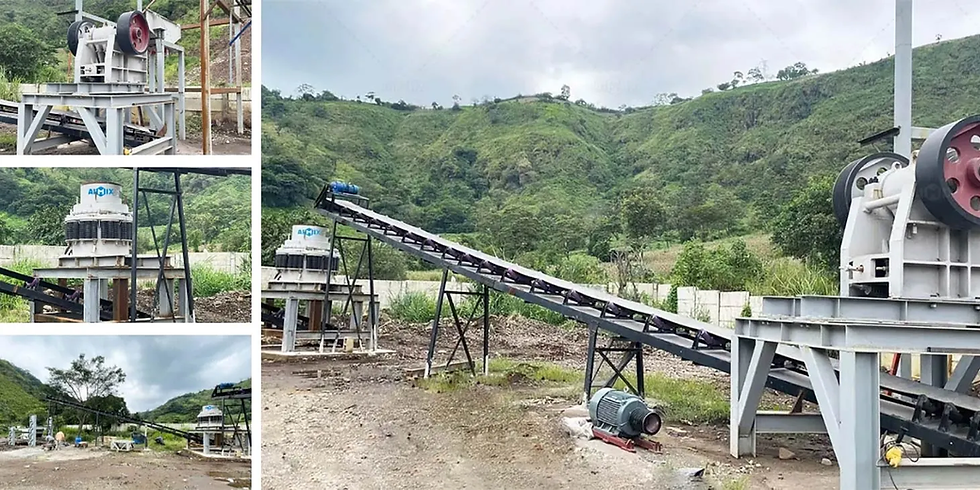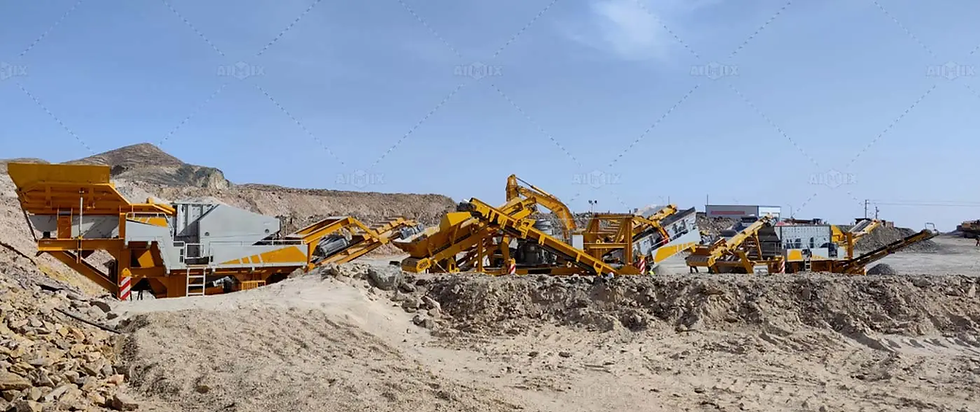Why Basalt Makes Ideal Road Base Aggregates – and the Crushers to Use
- aimixgroup china
- Mar 25
- 3 min read
Basalt, a dense and highly durable volcanic rock, is one of the most sought-after materials for road base aggregates. Its exceptional hardness, wear resistance, and ability to withstand extreme weather conditions make it a superior choice for road construction. When processed correctly, basalt delivers a stable foundation that enhances road longevity while reducing maintenance costs. However, to achieve the desired aggregate size and quality, the right crushing equipment is essential. Selecting the proper basalt crusher ensures efficient production and optimal material gradation, meeting the stringent requirements of modern infrastructure projects.
The Strength of Basalt in Road Construction
Superior Durability and Load-Bearing Capacity
Basalt’s unique mineral composition gives it an edge over other aggregates. It has an exceptionally high compressive strength, often exceeding 100 MPa, making it ideal for withstanding heavy traffic loads. Unlike softer materials, basalt does not degrade easily under repeated stress, reducing the formation of potholes and ruts in road surfaces. This durability ensures that roads built with basalt aggregates maintain their structural integrity over extended periods, even in regions with high vehicle loads.

Resistance to Weathering and Erosion
Natural road base materials are constantly exposed to environmental stressors, including moisture, temperature fluctuations, and chemical exposure from de-icing salts. Basalt’s low porosity prevents water infiltration, significantly reducing the risk of freeze-thaw damage. Additionally, its resistance to acid and alkali reactions ensures minimal degradation over time. Roads constructed with basalt aggregates retain their quality in harsh climates, extending their service life and lowering maintenance costs.
The Right Crushers for Basalt Processing
Primary Crushers: Breaking Down Large Basalt Blocks
Basalt’s extreme hardness requires robust primary crushers capable of handling tough materials without excessive wear. Mobile jaw crushers are commonly used for the initial crushing stage, efficiently reducing large basalt boulders into manageable sizes. Gyratory crushers are another viable option, especially for high-capacity applications, as they deliver consistent reduction ratios while withstanding heavy-duty operations.
Secondary and Tertiary Crushers: Refining Aggregate Quality
After primary crushing, basalt requires further refinement to achieve the precise size distribution needed for road base applications. Cone crushers excel at producing well-graded, cubical aggregates, making them the preferred choice for secondary and tertiary crushing. Impact crushers, particularly horizontal shaft impactors (HSIs), are also effective for shaping basalt into finer fractions, enhancing the material’s compaction properties. The selection of these crushers depends on the specific requirements of the road project, balancing production efficiency with aggregate quality.
Optimizing Crushing Operations for High-Quality Aggregates
Adjusting Crusher Settings for Desired Output
The performance of basalt crushing operations depends on optimizing crusher settings such as closed-side settings (CSS), feed gradation, and rotor speed. Fine-tuning these parameters ensures uniform aggregate size, reducing waste and improving the material’s performance as a road base. Automated crusher control systems further enhance efficiency by continuously monitoring wear and adjusting settings in real-time.

Investing in Wear-Resistant Components
Given basalt’s abrasiveness, crushers must be equipped with durable wear-resistant components. Manganese steel liners, tungsten carbide inserts, and high-chromium alloys help extend the lifespan of crusher parts, reducing downtime and operational costs. Regular maintenance, including replacing worn-out parts and monitoring feed consistency, further improves productivity and ensures high-quality aggregate output.
Basalt’s exceptional mechanical properties make it an ideal material for road base applications, ensuring long-lasting and resilient infrastructure. However, its hardness demands robust and efficient crushing solutions to maximize productivity and quality. By selecting the right combination of primary, secondary, and tertiary crusher machine for sale, construction companies can optimize their aggregate production while minimizing operational costs. Investing in high-quality crushing equipment ensures that basalt aggregates meet the highest standards, supporting the development of durable and cost-effective roads.



Comments